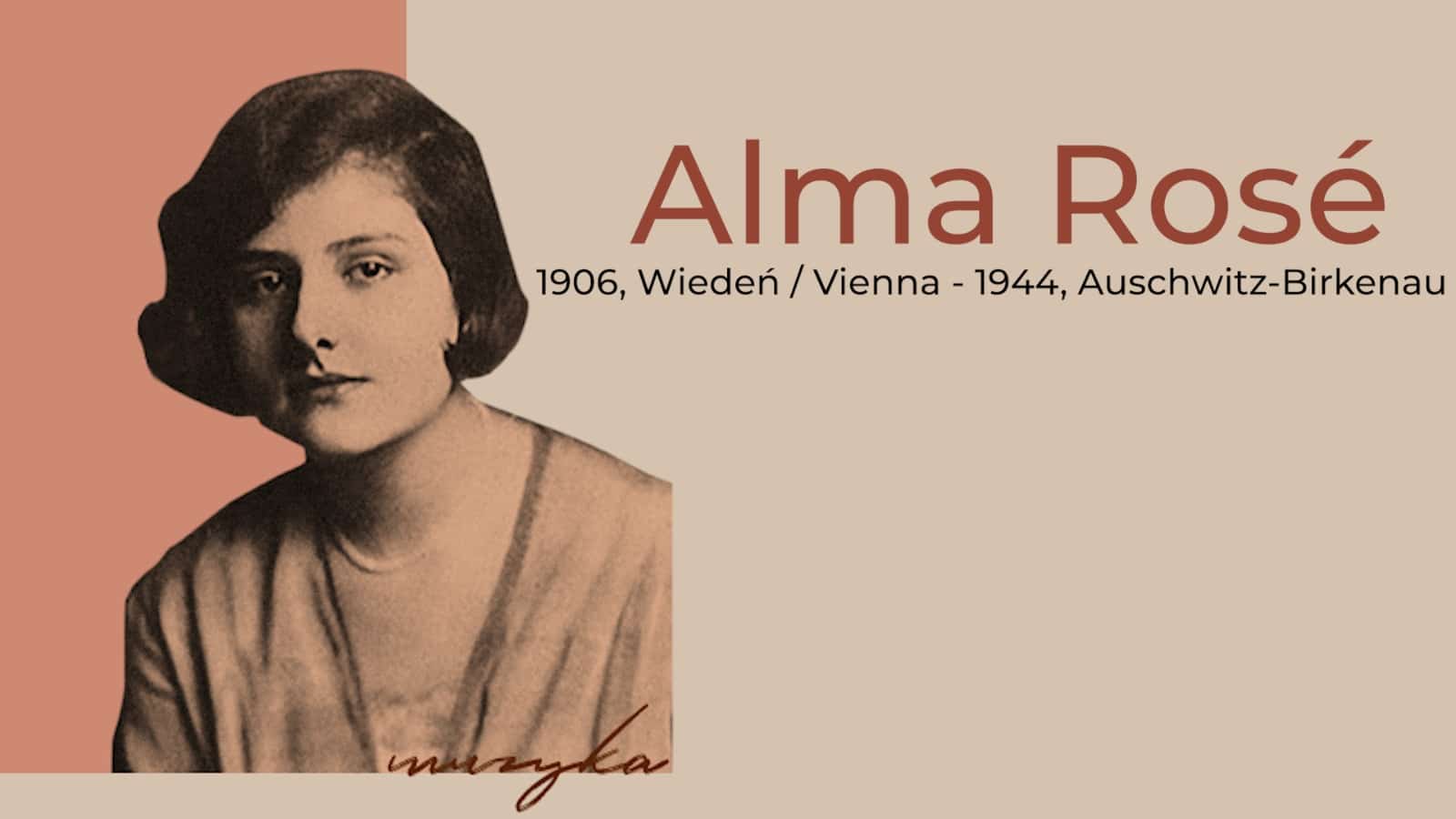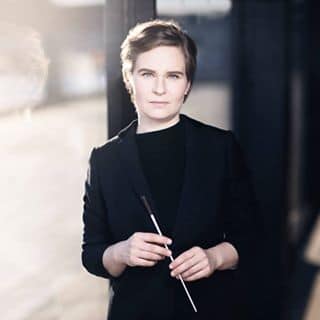Watch: New film on Mahler’s niece who died in Auschwitz
mainThe tormented life of Alma Rosé – violinist daughter of Mahler’s sister and the Vienna Philharmonic concertmaster – has been dramatised in a new film.
The production was financed by the Polish city of Wroclaw.






See they’re having to play Brahms again!
I have no idea why this “composer” is so reviled, to tell you the truth. Look at his D minor piano concerto and the recapitulation of the first movement. I can’t play anything written that badly, he klunks down the whole f major buildup up in D major, not changing any at all voicing as if that’s the same resonance, although a minor third lower. It’s terrible terrible bad writing and ruins the whole rest of the concerto.
Look Vaclav, this posting is about a terribly tragic event that truly happened. It’s not about you and your unpopular position on Brahms. Please park your ego for a moment.
Incredibly sad. The music makes it even more unbearable.
Listen to just about ANYTHING Of Fanny Mendelssohn and you’ll see it was much better written then this BRAHMS they were forced to play….. Will people EVER learn, and stop giving such privilege to such aching “wormholes.”
Someone’s hearing needs testing.
Wow. Can’t wait to see what they’ve done to it.
Thank you for posting this heroic and tragic video. I knew nothing of Alma Rosé. She is, I suppose, one of far too many millions who were lost due to the evil of people like Mandl and the indifference of too many who refused to believe or accept that it was happening. 80 years on it is still right and proper that she, and countless other less gifted and nameless victims, are remembered and commemorated, to use a term used in a slightly narrower context ‘Lest we forget’. Thank you again for making me pause and think how such beauty and bestiality can exist side by side.
Even for people who already know about Alma Rose and her story, watching this film is so worth it.
I wasn’t sure how effective this Polish production would be, but after viewing it, I think it succeeds on many levels.
Unendlich traurig!°
“Mandl” is Maria Mandl (sometimes spelled Mandel).
I can recommend ‘Alma Rose:Vienna to Auschwitz’ by Newman & Kirtley. A harrowing story that needs to be told.
That’s a superb book.
The book by Richard Newman and Karen Kirtley was published in 2000 by Amadeus Press, and is still available new (either hardcover or paperback), and used copies are readily available.
It is a substantial book of 407 pages and is the best source of information about Alma Rosé. Pp. 211-328 detail her experience in Birkenau.
Thank you for posting this, Norman.
I’ll watch it on a quieter day, when I’m alone.
I can’t believe there are still Holocaust deniers around. The world must NEVER forget what the Nazi bastards did.
it is sad that she did not stay in england. she would
of survived.
Well, I watched it.
I’m glad I did and I’m sorry I did.
I’m glad because it’s a beautifully done film about a subject that no one should ignore or deny or forget.
I’m sorry because I won’t be sleeping so well the next few nights.
That was a very interesting and moving film. Thank you for giving me the opportunity to watch it.
any living descendant of Mahler’s still around today?
Yes, there are. Granddaughter Marina Mahler runs The Mahler Foundation, which has a website which shows a detailed family tree, as well lots of photos documenting Mahler and Alma’s life (including lots of info on the various locations where they lived in Austria). Mahler’s surviving daughter, Anna, had two daughters of her own. Marina’s father was the conductor Anatole Fistoulari. He was mostly based in London and was most famous as a ballet conductor. The other Granddaughter – also named Alma! – her father was the Viennese publisher Paul Zslonay. Marina’s Mahler Foundation is a very active one, dedicated to promoting world piece and respect for the world’s environment, as well as promoting Mahler’s music. It’s well worth taking a look at. Furthermore, there are other Mahlers in the U.S. and elsewhere, due to the fact that Mahler had a few surviving siblings. Again, the family tree at the Mahler Foundation maps all that out.
Arthur Miller’s 1980 TV film PLAYING FOR TIME features Alma (played by Jane Alexander) but focuses on Fania Fenelon (controversially but superbly played by Vanessa Redgrave). When I was a schoolmaster I showed this videotape every year to Year 9 pupils (LVth as we called them) until dvd players took over. It is a powerful work of art. Vanessa Redgrave’s father Michael was one of my predecessors teaching literature at the school.
“Playing for Time” is the title, in English translation, of Fénelon’s Sursis pour l’orchestre (published in 1976). Many statements in Fénelon’s book have been disputed by those who were with Fénelon in Birkenau, especially her portrayal of Alma Rosé. A detailed refutation of Fénelon is Susan Eischeid, The Truth about Fania Fénelon and the Women’s Orchestra of Auschwitz-Birkenau (Palgrave Macmillan, 2016).
Aside from its questionable accuracy, “Playing for Time” is confusing to read, because Fénelon uses pseudonyms of her own creation for the actual names of those in Birkenau.
In happier times, Alma Rosé recorded the Bach Double Violin Concerto with her father and teacher Arnold Rosé (originally Rosenblum), the esteemed concertmaster, and it is harder to say which takes more getting used to, the very restrained vibrato that Arnold Rosé employed as a musician with both feet firmly in the 19th century preferences for vibrato and portamento, or the astounding cadenza that Hellmesberger inserted into his edition of the third movement.
While some sources you read are somewhat dismissive of Alma Rosé’s violin technique, I think that is likely a product of a sniffy attitude towards her Wiener Walzermädeln. She had the major concertos in her repertoire and I believe her debut featured the Tchaikovsky. It also appears (unconfirmed? some sources waffle on this) that she studied with Otakar Ševčík, the most famed/notorious teacher of pure technique of his era. Erica Morini was one of her long time friends and Morini was very much a Ševčík pupil.
Alma was briefly married to Váša Příhoda, and her husband’s Rosenkavalier suite for violin was one of her specialities so I’d be prepared to grant her a well developed technique on that basis alone.
“Alma was briefly married to Váša Příhoda”
Yes, they were married, and it was for 6 years 1930-1936 (although they were separated during the last 1 1/2 years). Is that “briefly”?
Perhaps not the best choice of adverb, I’ll grant you Malcolm.